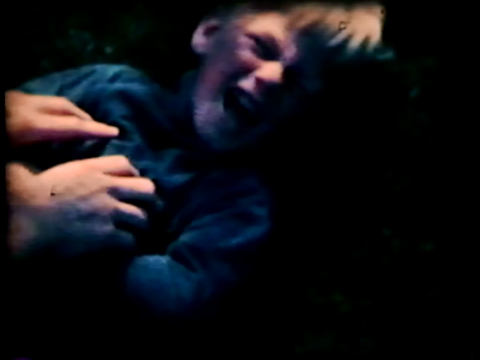
Mark Foss being tickled by his brother.
.
Jesus Understood
In 1961, my parents buy a split-level, four-bedroom house in a new subdivision in the west end of Ottawa called Pinecrest, a middle-class suburb where none of the mothers work (outside the house), and the kids walk home for lunch to find the front door unlocked. They are creating more space for their unexpected third child — me — although I never seem to find it.
I learn to tell time by the kitchen clock, which is seven minutes ahead so my father won’t be late for work. In the morning, I sit on his knee and eat half his breakfast grapefruit. In the afternoon, I kneel on the pink chesterfield, staring out the living room window for a sign of his imminent arrival on the horizon. I am in the crow’s nest of a ship, a pirate suffering from scurvy desperate for nourishment.
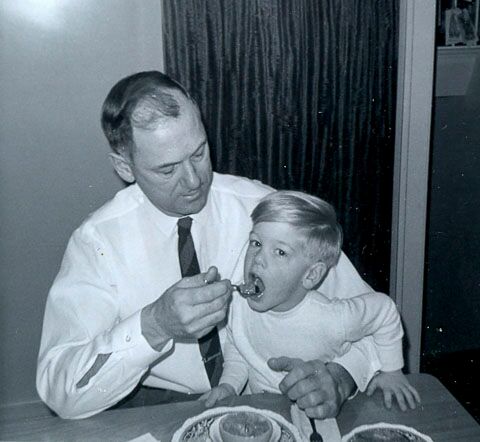
Like all of our neighbours, my family is white. Like most of them, we are vaguely Protestant. I have no religious instruction other than Uncle Arthur’s Bedtime Stories, which haunt my dreams. In one, a young boy is hit by a car. In the hospital, the boy in the next bed teaches him to hold his arm up at night to accept Jesus as his saviour. But the boy in the accident is pretty beat up. They have to prop up his arm on some pillows. The boy’s arm collapses when he dies overnight, but Jesus understood. I long to be understood too.
My father fears break-ins at the house during weekends to the cottage. Unsolicited, I pray the way I’ve seen on television with both hands folded to my chin. Fearing that Jesus will not understand, I cite a thesaurus of property crimes to ensure our house is not burgled, broken-into or robbed. Is it “A-men” or “Ah-men”? I hedge my bets, saying it both ways. A few times even, with variations, so that Jesus does not feel slighted and punish us for bad grammar or syntax.
A week after the minister from the United Church visits our house, my father drops me off at the church to join a friend in the choir. But my friend is not there. I am ten years old, too shy to put up my hand, too afraid to make waves. I sit alone, listening to the hymns in tears, waiting to be saved.
My mother doesn’t answer when the Jehovah’s Witnesses come to the door. She stays in the kitchen, and tells me to hide behind the pink chesterfield so they think no-one’s home. I wait forever, worried they will simply try the knob and find it unlocked. I want to understand who they are, but accept at face value the need to fear them. I lay low.
.
Ghosts
My father takes up so much space that, like my mother, I feel the only option is to be smaller-than-life. At a friend’s birthday party, I win the balloon for staying quiet the longest. It’s no effort at all since being well-behaved is my default position. It makes me invisible and, paradoxically, gives me the attention I crave.
Even my Old West action figures are unfailingly polite. Johnny West and Captain Maddox take turns watering their horses out of the back of the humidifier on top of the landing beside my parents’ bedroom. While my mother has one of her many five-minute rests, they tiptoe around the mesa and bring their mares back to the corral before my father gets home at 6:07 p.m. expecting dinner on the table.
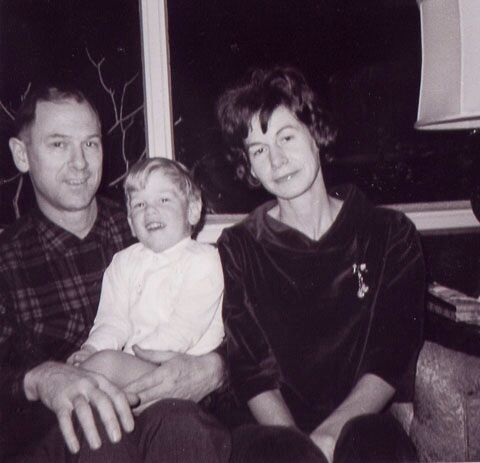
My parents eat upstairs, while my brother and I dine in the rec room in front of the television. He’s ten years older and gets final say on shows, but allows me to switch during commercials. With all the back and forth, the channel selector on the Zenith starts to go, allowing ghostly images from one show to cross into another. In his workshop, my father files a groove into the broken shaft of a Sherwood hockey stick so it fits perfectly over the channel selector. A firm push — a poke check, really — sends the phantoms back to the world where TV shows live when you’re not watching them.
The stick demarcates space between channels, but also between the two of us. We keep it handy on the coffee table, a desk my father got surplus from work. He cut the legs in half, and my mother varnished the oak surface in a deep red. The TV Guide, our sacred text, is on my brother’s side. He forbids me to draw moustaches, beards, and eye patches on the celebrities featured on the covers until the week is over, and of course I comply.
My older sister is long gone and, after my brother moves out, I eat downstairs alone. I can watch what I want now, but sometimes I watch his shows to pretend he’s still sitting beside me. I respect his rule for defacing the cover because he might visit from Winnipeg and I don’t want to disappoint him.
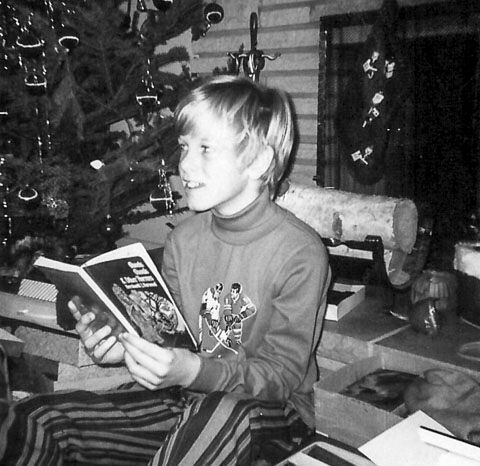
There are so few rules in my family that I need to make my own. On Christmas morning, I open my stocking and one present before waking the household. When I come home with a friend after school, the two of us play with my chemistry set on the deep freeze in the garage until my mother returns. I long for bigger rules and firmer principles. Unlike my action figures, I am malleable in all directions.
I don’t care for superheroes, identifying instead with the tormented vampire of my Dark Shadows comics. He pretends to be writing a book to cover his absence during daylight hours. I like how he flits between human and bat, how he moves between the past and the present, how he hides in plain sight. Now you see him, now you don’t.
.
Baby
In sixth grade, I start a five-year diary that gives four lines to take stock of the day. Not much room to express feelings, but that suits me fine. I look for them instead in the lives of others.
I hatch a plan to sneak into our classroom after school to flip through Nicole’s little black book. I fear the cleaning lady will see through me or that Nicole has not seen me at all. The best I can manage is writing her name in my diary that night. A few choice words.
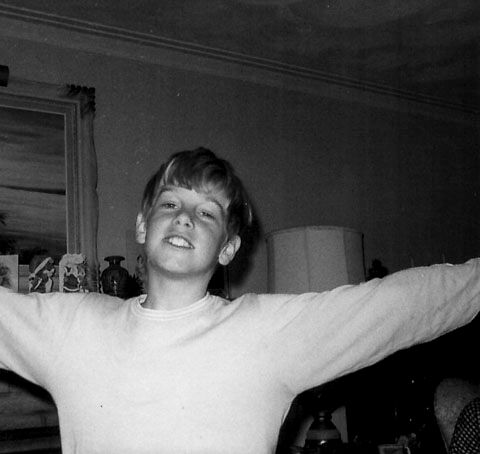
Nicole disappears with the other cool kids at recess while I play a ball game called “Baby” with my nerdy friends. Since players can twist their bodies but not move their feet, I roll the ball strategically to tag them out. I win a lot except the last game of the year. Because it is my last recess — the beginning of the end of childhood — my feet are glued to the earth, but my head is somewhere else. I am busy recording what to remember.
As the calendar year draws to a close, I am restless. Not for the excitement of a new year, but rather so I can repeat the description of last year’s “yummy dinner” in the space allotted for January 1. Echoes and symmetries. The promise of the familiar offers comfort I can find nowhere else.
.
Summers
One of my first books is Tommy Visits the Doctor, which offers a reassuring picture of a middle-aged male physician with greying temples who gives his child patients a lollypop when they leave. A parallel story shows a young bunny going to the rabbit doctor who receives a fat carrot on the way out of the burrow. I do not think to be afraid before reading the story.
I do not visit the doctor when the dead limb falls off the tree, carrying me to the ground. I lose my wind, look around for it in panic. How does my mother hear my gasps? I am in the woods, far from the cottage. She bids me rest in bed with the blinds closed, as if darkness itself will stop the new route my spine plans to take.
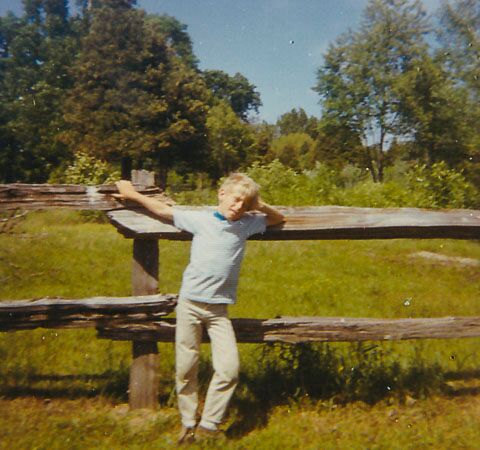
I live at the cottage with my mother all summer, dreading the arrival of my father on weekends. He is the great surgeon and I the nurse, expected to hand him the instrument required — a Phillips screwdriver, a square of coarse sandpaper, a pair of sidecutters or needle-nose pliers — before he himself knows it’s needed.
The tools are a mystery to me, much less interesting than the stories of Sherlock Holmes or Hercule Poirot. As I eliminate murder suspects, the troublelight droops in my hand, throwing my father’s work under the car into shadow. I have no defence, no alibi. But even as he chastises, I am secretly pleased since my guilt means he sees me.
.
Social Studies
I invite different friends to the cottage for a week at a time, but never Allan, one of my Chinese friends. I am not even sure we are friends at all. I share lockers with him from fifth to eighth grade. I play foot hockey with him at recess and when I curse for the first time at a bad play he enthuses that I’ve finally become one of the gang. The sense of belonging this creates makes me want to swear for joy.
I go to Allan’s birthday party every year, which is managed by his older sisters. We play hockey on the rink in back of the Catholic school near his home, and then play more games in his basement. I win first prize one year — a can of lychees in syrup. I feign appreciation, but it’s a strange reward, especially when the runner up gets a hockey puzzle in a can. It must be a Chinese custom, one more thing I don’t understand or question.
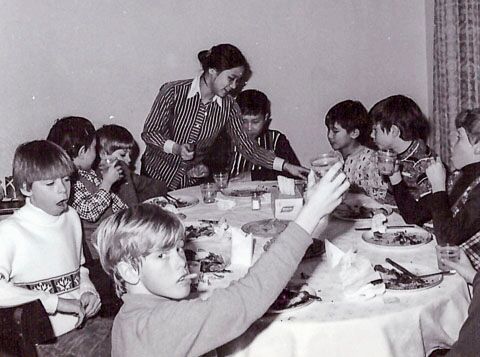
When Allan gets sick in eighth grade, I am the one who delivers a cassette tape of limericks recited by the class as a get-well-soon gift. My classmates record it dutifully, and I resent being picked as the messenger. The class knows without knowing this is no ordinary illness and no-one wants to get too close.
I visit Allan in the hospital where he wears a baseball cap. When he returns to school, he ends up on the “skin” team in gym class, and we all see the marks on his chest. He doesn’t seem to be the same. Even his hair is different.
He disappears again from school, and I deliver another tape of dumb poems. I bring him homework, too. Maybe his backdoor is unlocked, even if he lives on a less desirable street. But I don’t check. I don’t want to get trapped into spending time with him, of witnessing his decline. So I leave the books on the barbecue in the carport outside the door and call him from home. After all, I only go to his house on birthdays and he’s never been inside mine at all.
Allan misses graduation and the chance to leave five words to be remembered by in a cheap photocopied keepsake the teacher makes for all of us. So she writes something for Allan, making a joke based on his last name which rhymes with “wrong”. Like the limericks, it’s not so funny.
I wear brand new white wide-legged Howick jeans with four stars on the back pocket to the graduation party. Unlike everyone else who eats KFC, I get a plate of cold meat, which provokes many questions. Ask and ye shall receive. I want to be seen, and yet don’t stay for the dance, running home, faster than when I feared the bullies in third grade. Nicole will be there, and all the other girls I pine over and can’t approach.

The summer before high school I am up at the cottage, which is a good reason not to visit Allan in the hospital again. I don’t know whether he propped his arm up the night he died.
It’s a Chinese custom, I’m told, for the older children to handle the funeral. Same goes for the square of white paper containing a quarter and a candy they hand me at the wake. A candy to sweeten my loss, and money to buy more sweets.
He looks less real than ever, lying there, the first dead body I’ve ever seen. Our teary-eyed teacher hands out a tissue to everyone, a little melodramatically, but my own tears won’t come. Neither will words. Not here.
Ready or not, my childhood is over. What I have left is my desire to keep him alive. I hang onto the wrapped up sweet and the quarter, and the single page in Allan’s hand from Social Studies class. I must have borrowed it from him one day when I was sick and he got sick before I could give it back.
We were learning about Australians, how they have many of the same things we do in Canada. Most live in the cities. They enjoy life. These are the things worth remembering.
— Mark Foss
.
.
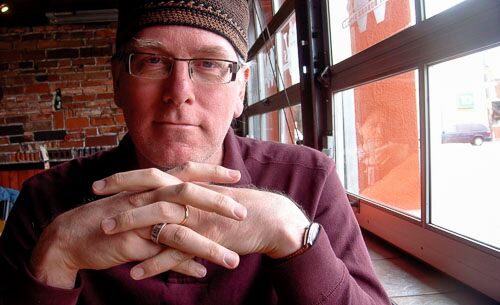
Born in Ottawa, and now living in Montreal, Mark Foss is the author of three books of fiction and numerous short stories. His most recent novel, Molly O, appeared in 2016. Spoilers, his first novel, was partly inspired by his radio drama, Higher Ground, which was broadcast on CBC in 2001. A collection of linked stories, Kissing the Damned, was longlisted for the ReLit Award in 2005. His stories have also appeared in such literary journals as The Fiddlehead and The New Quarterly, as well as in Canadian and American anthologies. He is currently completing a new novel. Visit him at www.markfoss.ca.
.
Thank you, Mark, for the remembering.
When I hear about or read the detailed memories of childhood such as those outlined in this very interesting and well written piece I wonder why I don’t have them. Are my childhood memories repressed ?Was I such a late bloomer that I didn’t start to process memories for the long term until much later in life than other people? Mark has framed his memories in what reads to me like trauma, albeit family trauma. Could the difference be explained by the types of Chompskyan Deep Structures we bring to the game?
Wow, I had no idea. I had such a different perception of what your childhood had been like. The familiar quote of ‘children should be seen and not heard’ comes to mind.
Very moving, poignant – my heart aching a bit – the negative merging with dad – if I had let you colour the TV Guide, perhaps things would have been different…
Thanks Mark for life seen through the pained and brilliant logic of childhood…..the impressions that mold the writer….the wry wit alongside the anguish….so good!